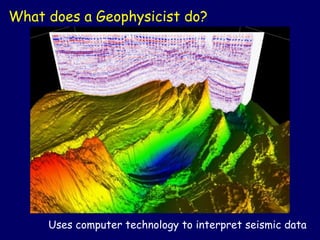All Categories
Featured
Table of Contents
What Are Geophysical Surveys & Why Do They Matter in Midvale Aus 2020
Are you looking for the right kind of b-school? Get in touch with MBA programs seeking prospects like you. Check out schools of all sizes, ranked colleges, city and big-campus schools and more. Apply. Pay. Prep. Study. Be successful. We've got you covered. Connect with master's programs around the nation to get an edge over the competition.

A geophysicist research studies different aspects of the earth. Watch a video to discover what a geophysicist: Geophysicists need to make a minimum of a bachelor's degree; however, this is for an entry-level position.
If you desire study you should pursue a Ph. D. Undergraduate coursework generally consists of geology, mathematics, ecological science, or physics. Postgraduate degree need more specific research studies in the specialized of choice. Areas can consist of oceanography, climatic physics, meteorology, planetary, petroleum, ecological, and mining. Job potential customers are greater if you have a strong background in computer technology or technology.
Geophysical Surveys: Definition & Methods in Helena Valley WA 2021
Access to these opportunities might be restricted depending on where you live; nevertheless, internships or summer season programs with geophysical business, university geophysics department, or the U.S. Geological Study can be options. You can find a list of a list of opportunities on the United States Geological Survey (USGS) sites' Path Programs tab (opens in another link).
If you have yet to graduate high school, taking as many science and mathematics classes as possible would be a plus. Geophysicists also deal with computers while researching, so computer courses can also be practical, as mentioned earlier in this article. Many geophysicists concentrate on a location of geophysics. The task description would alter pending on the specialty.
A geophysicist's tasks can consist of measuring, tracking, and recording data from various physical homes in the world. They also assess and examination information received. Geophysicists frequently have to take a trip worldwide to examine geological occasions that have actually taken place or may have been forecasted. Geophysics is a research-based profession field, therefore one must have the ability to assume, problem-solve, and question or obstacle formerly held assumptions from their gathered data.
Geophysical Survey - An Overview in Ellenbrook WA 2020
Jay Wellik, a geophysicist, studies volcanos. Geophysicists typically work full-time hours; however, they typically work irregular hours, as discussed previously.

You can discover extra details about Geophysicists in addition to additional instructional products on the U.S. Geological Survey site (links open in a new window). Laura Stern, of the U.S. Geological Survey at the Gas Hydrates Lab in Menlo Park, California: We make a variety of various hydrates in the laboratory.
We also make carbon dioxide hydrate, ethane hydrate, gas, a number of various structures. It's about 100 degrees chillier than the temperature at which these hydrate samples would dissociate, when they would disintegrate to ice plus gas on the tabletop.
Geophysical Exploration in Heathridge Aus 2021
So the samples we make, their polycrystalline. They look like snow, it looks like compacted snow however honestly, it does include gas inside. Take a little piece off here and as it heats up, you'll begin to see it pop. It's reverting to ice plus gas and then as the ice would melt as it continues to warm, it will end up being water plus gas.
My name is Steve Kirby, I'm a Geophysicist here at the U.S. Geological Study in Menlo Park. I work with Laura Stern who is likewise a Geophysicist in this laboratory that is devoted towards the examination of planetary ices and gas hydrates. Gas hydrates in nature occur in very remote places and they are very intricate with the interactions and conditions that they form under and samples that are raised are under some sort of alternation or decay.
This is an uncommon laboratory and there are just a handful of them worldwide and we are extremely lucky to be here at the Geological Survey and to have the chance of working on them. Bureau of Labor Statistics, U.S. Department of Labor, Occupational Outlook Handbook, Geoscientists. National Center for O * NET Development.
What Are Geological, Geochemical, in Bayswater Western Australia 2023
This video was produced by the government for the U.S. Geological Study. The USGS Gas Hydrates Lab is moneyed by the Department of Energy and the USGS Gas Hydrates Project.
Table of Contents
Latest Posts
How To Become A Geophysicist in Mount Claremont Oz 2023
Geophysical Survey Next Step In Carbon Storage Study in Brookdale Western Australia 2023
Geophysical Investigations in Calista Western Australia 2022
More
Latest Posts
How To Become A Geophysicist in Mount Claremont Oz 2023
Geophysical Survey Next Step In Carbon Storage Study in Brookdale Western Australia 2023
Geophysical Investigations in Calista Western Australia 2022